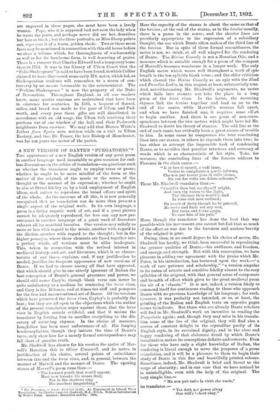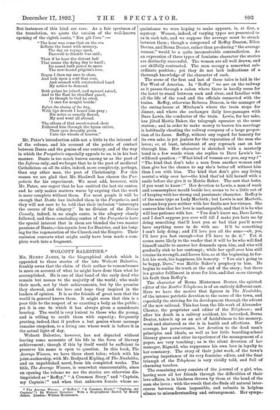A NEW VERSION OF DANTE'S "PURGATORIO." THE appearance of a
new English version of any great poem
in another language used invariably to give occasion for end- less discussions on the ethics of translation—on questions such as whether the translator ought to employ verse or prose; whether he ought to be more mindful of the form or the matter of the original, of the music or the sense, of the thought or the manner of its expression ; whether he ought to aim at literal fidelity or, by a bold employment of English idiom, seek rather to reproduce the broad effects and spirit of the whole. As the outcome of all this, it is now generally recognised that no translation can do more than present a single aspect of the original work. In its own language, a poem is a living organic work of art, and if a great picture cannot be adequately reproduced, far less can any new pre- sentment in another language of a great work of literature exhaust all its manifold beauties. One version may satisfy us more or less with regard to the music, another with regard to the diction, another with regard to the thought ; but in the higher passages, where these elements are fused together into a perfect whole, all versions must be alike inadequate.
This, taken in connection with the revived interest in medieval history. and art, and literature, which is so charac- teristic of our times. explains, and, if any justification be needed, justifies the frequent appearance of new versions of Dante. If we had to choose among all that have appeared, that which should give to one utterly ignorant of Italian the best conception of Dante's general greatness and power, we should still name Cary's; though blank verse can never be quite satisfactory as a medium for rendering the terza rima, and Cary is too Miltonic, and at times too stiff and pompous for the free and unconventional art of Dante. Of the versions which have preserved the terza rima, Cayley's is probably the best; but they are all open to the objections which the author of the present translation urges against them, that the terza rima in English sounds artificial, and that it maims the
translator by forcing him to sacrifice everything to the dis- covery of recurring rhymes. In the choice of measure,
Longfellow has been most unfortunate of all. His limping hendecasyllabics, though they imitate the time of Dante's verse, only show how far a merely formal correspondence may fall short of genuine truth.
Mr. Shadwell has chosen for his version the metre of Mar- vell's Horatian Ode to Oliver Cromwell, and he notes, in justification of his choice, several points of coincidence between this and the terza rima, and, in general, between the manner of Marvell and the manner of Dante. The opening stanza of Marvell's poem runs thus :— " The forward youth that would appear,
Must now forsake his muses dear, Nor in the shadows sing His numbers languishing."
• The Purgatory ef Dante Alighieri (1.27). An Experiment in Literal 'rev's Translation. By Charles Lancelot Shadwell, MA., B C.L. With an Introduction by Welter Pater. London: Macmillan and Co. 1892.
Here the capacity of the stanza is about the same as that of the terzina ; at the end of the stanza, as in the terzine usually, there is a pause in the sense ; and the shorter lines are peculiarly appropriate to the expression of a subsidiary thought, the use which Dante often makes of the third line of the terzina. But in spite of these formal resemblances, the metre is not, we think, at all well adapted for the rendering of Dante. The Divine Comedy is not a Horatian Ode, and a measure which is suitable enough for a poem of the compass of Marvell's becomes wearisome in a longer work. The only English metre which wears well throughout a work of epic length is the ten-syllable blank verse ; and the older criticism which classed the Divine Comedy as an epic with the Iliad and Paradise Lost is, in this respect at least, substantially true.
And, notwithstanding Mr. Shadwell's arguments, no metre which falls into stanzas can take the place in a long poem of the terza rima. In the latter, the recurring rhymes link the terzine together and lead us on to the end of the canto, while Marvell's stanzas fall apart, and when we have finished one, it requires some effort to begin another. And there is one point of non-corre- spondence between the two metres which might have led Mr. Shadwell to doubt his theory of stanzas. The odd line at the end of each canto has evidently been a great source of trouble to him. In some cases he compresses the four concluding lines into one stanza, in others he expands them into two ; he has either to attempt the impossible task of condensing Dante, or to sacrifice that peculiar terseness and economy of words which is so characteristic of his style. Take, for
instance, the concluding lines of the famous address to
Florence in the sixth canto :—
"E se ben ti ricordi, e vedi lume,
Vedrai to simigliante a quells inferma, Che non pub trovar posa in sulle plume, Ma con dar volts suo dolore scherma."
These Mr. Shad well translates thus :— " Could'st thou but see thyself aright,
And turn thy vision to the light, Thy likeness thou would'st find In some sick man reclined; On couch of down though he be pressed, He seeks and finds not any rest, But turns and turns again, To ease him of his pain."
Here, though the translator has done the best that was possible with his instrument, one cannot but feel that so much of the effect as was due to the bareness and austere brevity of the original is gone.
Owing, then, in no small degree to his choice of metre, Mr.
Shadwell has hardly, we think, been successful in reproducing the greater qualities of Dante,—his swiftness, and freedom, and energy, and strength. But with this reservation, we have pleasure in adding our agreement with the praise which Mr. Pater, in his introduction, has bestowed upon the work,—" a work of rare patience and scholarship," " a version singular in its union of minute and sensitive fidelity almost to the very syllables of the original, with that general sense of composure and breadth of effect which gives to the great medieval poem the air of a classic.' " It is not, indeed, a version likely to commend itself for continuous reading to those who approach Dante with no previous knowledge of his language; for such, however, it was probably not intended, or so, at least, the printing of the Italian and English texts on opposite pages seems to indicate. But those who are already Dante scholars will find in Mr. Shadwell's work an incentive to reading the Purgatorio again ; and, though they may miss in his transla- tion some of the fire of the original, they will find also a source of constant delight in the crystalline purity of its English style, in its sustained dignity, and in the close and happy rendering of that elaborate detail by which Dante's imagination makes its conceptions definite and concrete. Even for those who have only a slight knowledge of Italian, the rendering is literal enough to serve the purposes of a prose translation, and it will be a pleasure to them to begin their study of Dante in this fine and beautifully printed volume.
Sometimes, indeed, Mr. Shadwell is brief and literal to the verge of obscurity ; and in one case that we have noticed he is unintelligible, even with the help of the original. The very simple line,- " Ma non pub tutto la virtu the vuole,"
he translates ;—
"Yet doth not power alway Our will's behest obey."
But instances of this kind are rare. As a fair specimen of the translation, we quote the version of the well-known opening of the eighth canto, "Era gill, fora"
The hour was come that on the sea Softens the heart with memory, The day on voyag e sped,
Farewell to friends was said ; Then if he hear the distant bell That seems the dying day to knell; Its sound hath power to move The new-bound pilgrim's love.
Began I then my ears to close, And look upon a soul that rose,
And seemed with outstretched hand My notice to demand.
Both palms he joined, and upward raised,
And to the East he steadfast gazed, As though to God he cried, I care for nought beside.'
Before the closing of the day, With lips devout I heard him pray ; His notes so sweetly flowed, My soul went all abroad.
The others of that sweet-voiced choir Followed him through the hymn entire, Their eyes devoutly given Unto the wheels of heaven."
Mr. Pater's introduction adds not a little to the interest of of the volume, and his account of the points of contact between Dante and the genius of our century, and of the way in which the Purgatorio especially appeals to us, is in his best
manner. Dante is too much known among us as the poet of the Inferno only, and we forget that he is the poet of medieval Catholicism on all its sides, indeed, more completely, perhaps, than any other man, the poet of Christianity. For this reason we are glad that Mr. Shadwell has chosen the Pur-
gatario for his experiment. We mast add, however, with Mr. Pater, our regret that he has omitted the last six cantos, and he only makes matters worse by arguing that the work is more complete without them. For most people it will be enough that Dante has included them in the Purgatorio, and they will not care to be told that their inclusion "interrupts the course of the allegory." In no division of the Divine Comedy, indeed, in no single canto, is the allegory closely followed, and these concluding cantos of the Purgatorio have the special interest that in them are blended the two master passions of Dante,—his mystic love for Beatrice, and his long- ing for the regeneration of the Church and the Empire. Their omission converts what might easily have been made a com- plete work into a fragment.







































 Previous page
Previous page